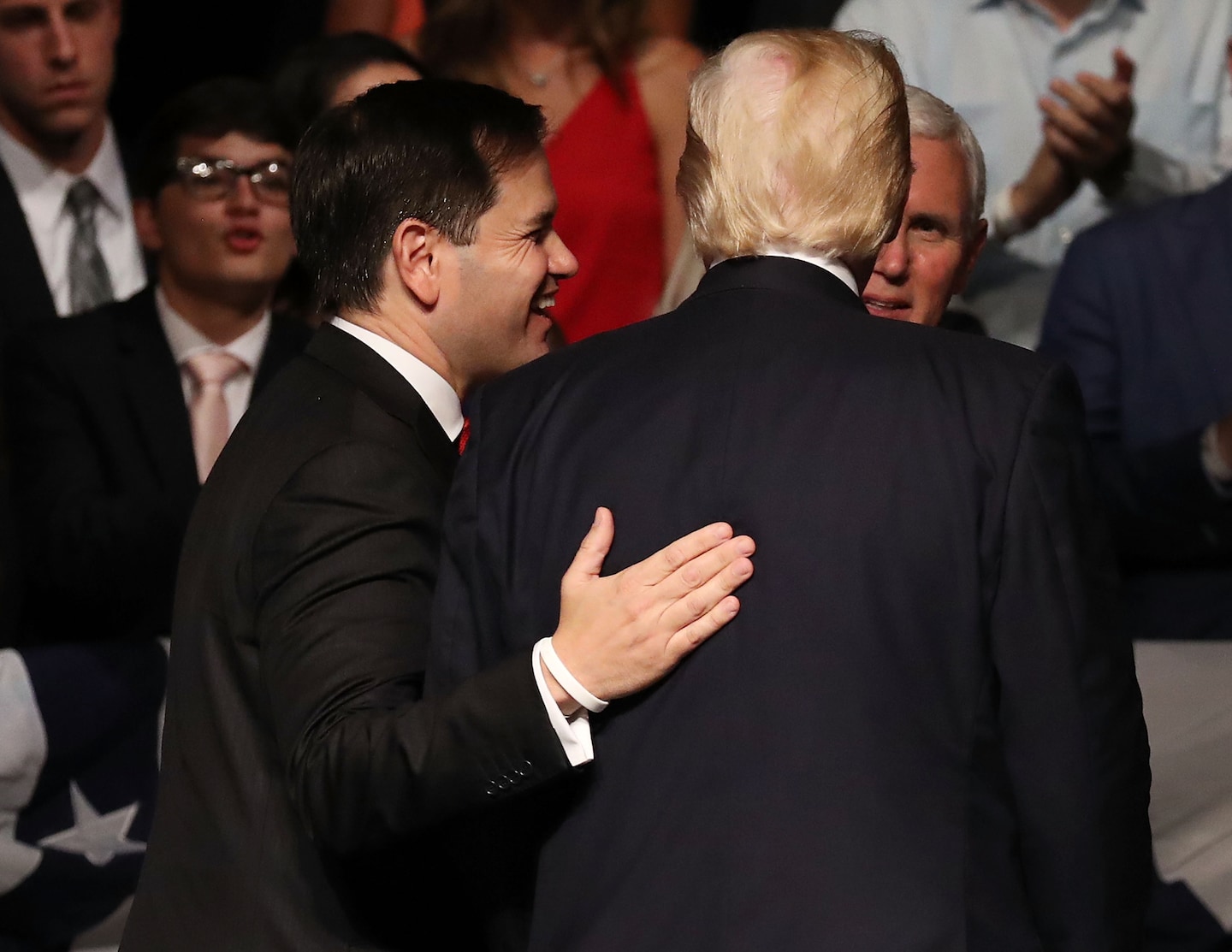Marco Rubio’s curious summary of his committee’s Russia report

But even as the report landed, the committee’s acting chairman, Sen. Marco Rubio (R-Fla.), sought to downplay, if not directly contradict, those findings.
Rubio joined in a statement with five other committee Republicans in asserting something the report does not — that “the Committee found no evidence that then-candidate Donald Trump or his campaign colluded with the Russian government.” Rubio added in his personal statement that he could say this “without any hesitation.”
The report, though, does quite clearly hesitate on this point.
Not only does the report say Manafort was in close and increasing contact with a Russian intelligence officer, but it flatly raises the possibility that both were involved in the centerpiece of Russia’s efforts: the hacked emails.
The report says “some evidence suggests Kilimnik may be connected to the [Russian] GRU hack-and-leak operation,” though it’s based on “a body of fragmentary information.”
That evidence is then redacted.
The report also says, “Manafort’s involvement with the GRU hack-and-leak operation is largely unknown.” Then it adds: “Two pieces of information, however, raise the possibility of Manafort’s potential connection to the hack-and-leak operations.”
That evidence, too, is redacted.
The report we can see may not shed light on what specific evidence there is and how compelling it is. But it certainly indicates there is evidence that a close Manafort ally might have been involved and even that Manafort himself could have been. Just because it may not be a smoking gun doesn’t mean it’s not evidence.
The report also explicitly says this is an open question. And it states that we don’t have this nailed down for a very specific reason: Manafort repeatedly and conspicuously lied about it.
The report says Manafort’s lies “foreclosed direct insight into a series of interactions and communications which represent the single most direct tie between senior Trump Campaign officials and the Russian intelligence services.” It also suggests that Manafort’s motive in lying was inexplicable, given it violated his plea deal and opened him up to more jail time.
In other words, it’s not a report that treats this as a settled issue in any way. It seems to go out of its way to say precisely the opposite and raise the possibility of coordination. It repeatedly calls the Manafort-Kilimnik nexus the centerpiece of its investigation. It notes that we unfortunately have limited insight into these very significant events, but that some evidence does indeed point to the Trump campaign chairman’s potential implication in Russia’s efforts.
Rubio’s statements are perhaps technically justifiable. “Collusion” is a malleable word with no specific legal meaning. Likewise, saying there is “no evidence” could, if we’re being charitable, be read as saying there’s nothing terribly conclusive.
But it’s also apparent that the head of the committee is aligning with the GOP’s and Trump’s long-held talking points on this, despite the new evidence. That’s a notable development in a committee that has previously prided itself on keeping politics at arm’s length.
The statement from Rubio and five other Republicans was not endorsed by the man he recently replaced as the committee chairman, Sen. Richard Burr (R-N.C.). Burr stepped aside amid controversy over suspiciously-timed stock trades early in the coronavirus pandemic. Before that, though, he earned praise for running a thorough, bipartisan investigation that took the Russia probe seriously. While other Republicans echoed Trump’s “no collusion” talking points and the formerly GOP-run House intelligence committee devolved into rank partisanship, Burr largely avoided all that in that name of letting the work speak for itself.
Nor did the committee’s lead Democrat, Vice Chairman Mark R. Warner (Va.), sign on to a competing Democratic statement Tuesday that said the report did indeed show collusion.
But while the Burr-Warner duo that led much of the investigation is apparently continuing to shy away from the kind of hard-and-fast conclusions of their colleagues, Rubio has chosen to go in a different direction. The minority Democrats’ statement is political too, but’s not joined in by the person actually running the committee or even their party’s lead committee member. They can also cite any number of things in drawing such a subjective conclusion about what is, again a nebulous, nonlegal term — including Roger Stone/WikiLeaks and the Trump Tower meeting, in which opposition research about Hillary Clinton was quite literally sought from a Russian lawyer with ties to Vladimir Putin. Rubio, by contrast, suggests he’s flatly dismissing the idea that there’s any evidence that even merits consideration.
One wonders how that is being perceived by the committee staff who spearheaded this years-long probe, wrote the nearly 1,000-page report and seemed to see these things as very valid open questions with real evidence — however limited — behind them. What impact might that have on future investigations, when the acting chairman’s statements seem to at best gloss over and at worst dismiss such findings?
It also raises the question of why, if Rubio felt so strongly about this conclusion, he didn’t push for it to be included in the report as the head of the committee. Perhaps that’s because he wanted the report itself to be more bipartisan, even if his statements aren’t. Perhaps it’s because there simply wasn’t enough support for it, given Burr and another committee Republican, Sen. Susan Collins (Maine), declined to sign on to the statement, and the committee has only an 8-to-7 GOP majority.
Whatever the case, it’s a significant development in what has been perhaps the most bipartisan committee in Congress for years — and one of the most consequential, too.






